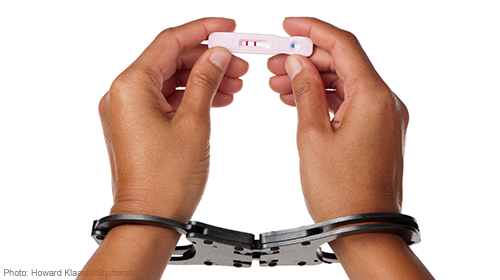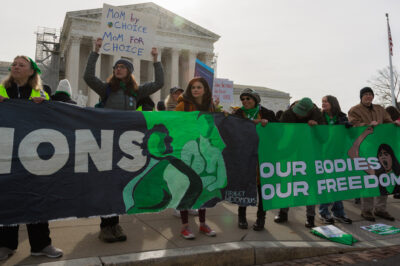
This summer, Tennessee thumbed its nose at doctors, nearly every national medical association, addiction experts, and women’s right activists and passed a law that essentially criminalizes pregnancy. In short, this deeply misguided law risks the health of women and babies by threatening expectant mothers who struggle with addiction or substance abuse with jail time, forcing those women who need health care the most into the shadows.
Already, women are being arrested and separated from their children – instead of getting support – because they suffer from drug addiction.
Now, a federal prosecutor wants in on the action: The U.S. Attorney for the Eastern District of Tennessee William C. Killian issued a statement bragging that Lacey Weld would serve an enhanced (in other words, extended) sentence for her role in an alleged drug conspiracy because she was pregnant at the time, even though she had already fully cooperated with authorities in exchange for a reduced sentence. In other words, the prosecutor singled out Ms. Weld for harsher penalties solely because she was pregnant. Unfortunately, after a hearing riddled with medical and scientific inaccuracies, a judge agreed to the enhancement.
Addiction is not a crime. Neither is being pregnant. That is why we joined a friend-of-the-court brief filed by the National Advocates for Pregnant Women, on behalf of leading constitutional, medical, and public health experts, asking the Sixth Circuit Court of Appeals to reverse the decision to punish Ms. Weld for her pregnancy. We have also asked Attorney General Holder to renounce the federal prosecutor in Tennessee’s actions and ensure that no other federal prosecutor takes this position in the future.
Not only is criminalizing pregnancy flatly unconstitutional, it’s dangerous for women, families, and babies.
Though the prosecutor might claim that doling out extra punishment to pregnant women protects babies, the evidence is crystal clear that policies like these don’t support healthy pregnancies. Leading medical groups like the American Medical Association and the American Academy of Pediatrics have long opposed these types of laws and policies. By threatening pregnant women with prosecution, these policies can drive a woman struggling with addiction away from health care and discourage her from seeking treatment, including prenatal and pregnancy-related care.
Who does that help, other than extreme prosecutors or legislators looking to enhance their reputations?
We all want women and babies to be healthy, and that’s why we should follow the lead of medical professionals here, not prosecutors. Pregnancy and addiction should be considered a public health issue, not a criminal one. We cannot allow emotion, stigma, and junk science, like the grossly inaccurate statements made during the course of Ms. Weld’s sentencing hearing, to guide policy.
Pregnant women who struggle with addiction or substance abuse don’t need harsher sentences. They need better access to health care.
If threatening the health of women and families weren’t awful enough, moves like this fling open the door to prosecutions for a never-ending list of behaviors that are common because they “risk the health of the fetus.” Do we really want to open the door for extreme politicians to punish pregnant women for an endless list of things – like not exercising enough, working long hours, being exposed to certain chemicals on the job, or being unable to afford regular prenatal care?
Politicians – and prosecutors – simply have no business playing doctor by trying to make pregnancy a crime, just as they have no business interfering with women’s other medical decisions. When they do, the results can be disastrous.
Those really concerned with the welfare of women and babies would do well to make sure pregnant women struggling with addiction have better access to health care, not use them as examples to further their own private or political gain.
Learn more about abortion legislation and other civil liberty issues: Sign up for breaking news alerts, follow us on Twitter, and like us on Facebook.




